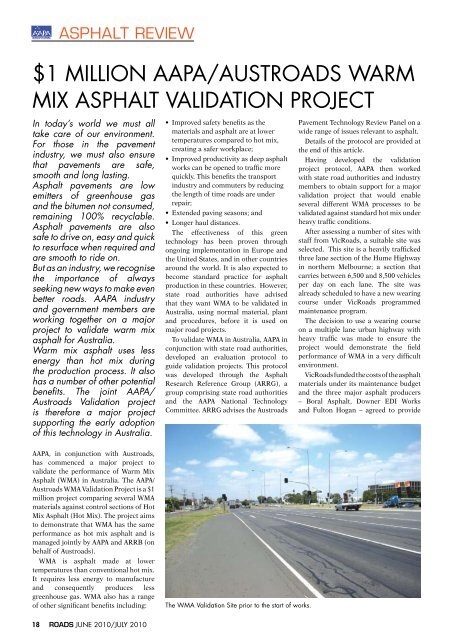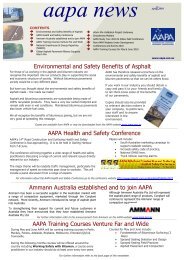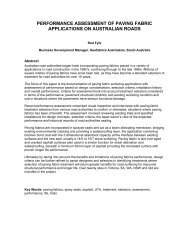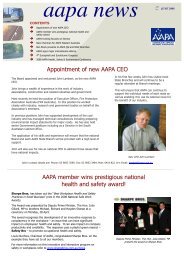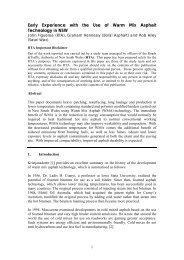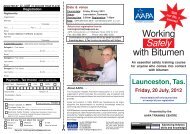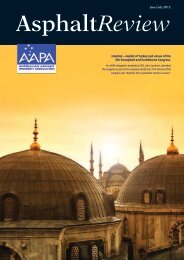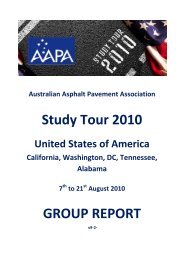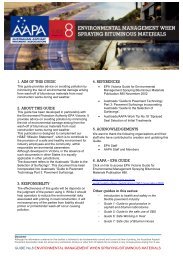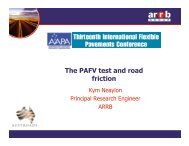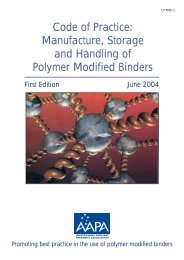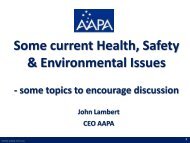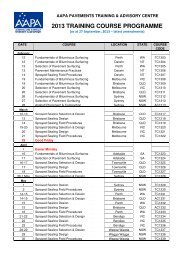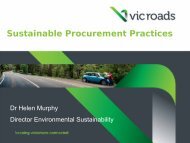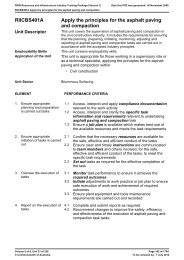Asphalt Review - Volume 29 Number 2 (June / July 2010)
Asphalt Review - Volume 29 Number 2 (June / July 2010)
Asphalt Review - Volume 29 Number 2 (June / July 2010)
You also want an ePaper? Increase the reach of your titles
YUMPU automatically turns print PDFs into web optimized ePapers that Google loves.
ASPHALT REVIEW<br />
$1 Million AAPA/Austroads Warm<br />
Mix <strong>Asphalt</strong> Validation Project<br />
In today’s world we must all<br />
take care of our environment.<br />
For those in the pavement<br />
industry, we must also ensure<br />
that pavements are safe,<br />
smooth and long lasting.<br />
<strong>Asphalt</strong> pavements are low<br />
emitters of greenhouse gas<br />
and the bitumen not consumed,<br />
remaining 100% recyclable.<br />
<strong>Asphalt</strong> pavements are also<br />
safe to drive on, easy and quick<br />
to resurface when required and<br />
are smooth to ride on.<br />
But as an industry, we recognise<br />
the importance of always<br />
seeking new ways to make even<br />
better roads. AAPA industry<br />
and government members are<br />
working together on a major<br />
project to validate warm mix<br />
asphalt for Australia.<br />
Warm mix asphalt uses less<br />
energy than hot mix during<br />
the production process. It also<br />
has a number of other potential<br />
benefits. The joint AAPA/<br />
Austroads Validation project<br />
is therefore a major project<br />
supporting the early adoption<br />
of this technology in Australia.<br />
• Improved safety benefits as the<br />
materials and asphalt are at lower<br />
temperatures compared to hot mix,<br />
creating a safer workplace;<br />
• Improved productivity as deep asphalt<br />
works can be opened to traffic more<br />
quickly. This benefits the transport<br />
industry and commuters by reducing<br />
the length of time roads are under<br />
repair;<br />
• Extended paving seasons; and<br />
• Longer haul distances.<br />
The effectiveness of this green<br />
technology has been proven through<br />
ongoing implementation in Europe and<br />
the United States, and in other countries<br />
around the world. It is also expected to<br />
become standard practice for asphalt<br />
production in these countries. However,<br />
state road authorities have advised<br />
that they want WMA to be validated in<br />
Australia, using normal material, plant<br />
and procedures, before it is used on<br />
major road projects.<br />
To validate WMA in Australia, AAPA in<br />
conjunction with state road authorities,<br />
developed an evaluation protocol to<br />
guide validation projects. This protocol<br />
was developed through the <strong>Asphalt</strong><br />
Research Reference Group (ARRG), a<br />
group comprising state road authorities<br />
and the AAPA National Technology<br />
Committee. ARRG advises the Austroads<br />
Pavement Technology <strong>Review</strong> Panel on a<br />
wide range of issues relevant to asphalt.<br />
Details of the protocol are provided at<br />
the end of this article.<br />
Having developed the validation<br />
project protocol, AAPA then worked<br />
with state road authorities and industry<br />
members to obtain support for a major<br />
validation project that would enable<br />
several different WMA processes to be<br />
validated against standard hot mix under<br />
heavy traffic conditions.<br />
After assessing a number of sites with<br />
staff from VicRoads, a suitable site was<br />
selected. This site is a heavily trafficked<br />
three lane section of the Hume Highway<br />
in northern Melbourne; a section that<br />
carries between 6,500 and 8,500 vehicles<br />
per day on each lane. The site was<br />
already scheduled to have a new wearing<br />
course under VicRoads programmed<br />
maintenance program.<br />
The decision to use a wearing course<br />
on a multiple lane urban highway with<br />
heavy traffic was made to ensure the<br />
project would demonstrate the field<br />
performance of WMA in a very difficult<br />
environment.<br />
VicRoads funded the costs of the asphalt<br />
materials under its maintenance budget<br />
and the three major asphalt producers<br />
– Boral <strong>Asphalt</strong>, Downer EDI Works<br />
and Fulton Hogan – agreed to provide<br />
AAPA, in conjunction with Austroads,<br />
has commenced a major project to<br />
validate the performance of Warm Mix<br />
<strong>Asphalt</strong> (WMA) in Australia. The AAPA/<br />
Austroads WMA Validation Project is a $1<br />
million project comparing several WMA<br />
materials against control sections of Hot<br />
Mix <strong>Asphalt</strong> (Hot Mix). The project aims<br />
to demonstrate that WMA has the same<br />
performance as hot mix asphalt and is<br />
managed jointly by AAPA and ARRB (on<br />
behalf of Austroads).<br />
WMA is asphalt made at lower<br />
temperatures than conventional hot mix.<br />
It requires less energy to manufacture<br />
and consequently produces less<br />
greenhouse gas. WMA also has a range<br />
of other significant benefits including:<br />
The WMA Validation Site prior to the start of works.<br />
18 ROADS JUNE <strong>2010</strong>/JULY <strong>2010</strong>


